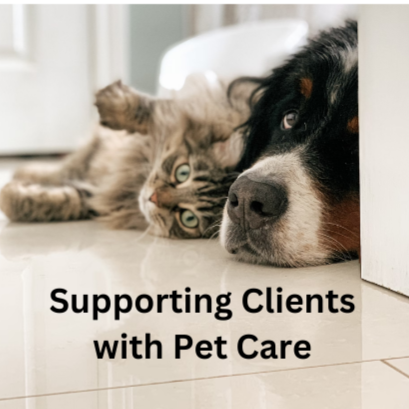
Pets have such a positive impact on our wellbeing and health, and are an important part of the family for many of our clients. They can provide positive responsibility, giving motivation and purpose. However illness, disability and recovery from an injury or operation can impact on the ability to care for pets, and should be considered as part of a holistic OT assessment.
Even if another family member offers to take on these responsibilities, occupations such as shopping for pet food, attending vet appointments, putting food out, walks and grooming may be important roles to your clients. It is therefore part of our job to help our clients break down the activity analysis involved in aspects of their pet care, identify which of these tasks are essential and important that they are part of, and help them find ways to achieve this. This may be through adapting ways to perform physical tasks, and also strategies to overcome cognitive barriers such as memory loss.
Pet care can be used as part of goal setting in rehabilitation, providing graded, functional, meaningful goals to work towards.
Breaking down pet care into this level of detail can also help with supporting clients to get a pet for the first time, by helping to identify and overcome barriers.
In this post I will look at some of the common aspects of pet care, potential difficulties, and ways to overcome these barriers.
Preparing food
Opening packaging such as tins and sachets can pose the same problems as the clients may experience with their own food preparation. Various kitchen aids are on the market to help those who only have use of one hand, or who experience pain or poor grip, such as automatic can openers and adapted cutlery. Some clients may also benefit from lever style taps for providing drinking water and washing up, which may be available through a Disabled Facilities Grant.
Bending to put down food bowls
Bending to put bowls onto the floor can be difficult or painful, may increase falls risk, and go against hip precaution advice post surgery. In these cases, some pet owners prefer to put bowls onto a raised surface, whether an existing worktop or table, or a low platform. There are also a variety of elevated food bowls and stands on the market, including ones with long handles to make it possible to pick them up without bending.
Cleaning out litter trays
Bending or crouching for the time needed to clean litter trays can be challenging. Litter trays can be moved onto a raised surface, with room for the cat to enter and exit easily. Clients can place a chair next to the litter tray, to be seated when scooping out mess. Some litter trays come with a lid and handle, so the whole tray can be lifted onto a more accessible surface. Purchasing lighter weight litter such as wood shavings can help with this. Another option is to use liners, to reduce the need of washing the whole tray as regularly. Long handled scoopers can also be useful. There are self cleaning litter trays on the market, some of which require cleaning every week or so, others which even connect to water and waste outlets, however these can be expensive.
Grooming
Grooming can be an important and therapeutic bonding activity for human and pet, relieving stress and promoting wellbeing. For clients who struggle with this on their own, an OT intervention may include planning the activity with another person, who can facilitate but not take over. This may be a discussion that includes other family members about the importance of this activity to the client, and how to support them with doing what they can.
Dog walking
Owning a dog can be a great way to promote physical health, encourage time spent in nature, and meet people. However illness, disability and injury can restrict this. For some clients, providing the level of exercise that their dog/s need can become difficult. For these clients they should be supported to take their dogs out when they can, with another person potentially supporting with a wheelchair for longer distances. The Cinnamon Trust are a charity who can help with dog walking for those who struggle.
Holding the lead
Specialist dog leashes are available for those with reduced grip or fine motor skills, as are magnetic connectors for easy connection and release. Hands free wheelchair attachments are available for leads for dogs who don’t pull. Also available are shock absorbing leads which absorb sudden jolts
Picking up balls and dog poo
Long handled dog ball launchers and pooper scoopers are easily available.
Getting a pet for the first time
You may work with clients who would like and would benefit from having a pet, but may need help with understanding what is involved, learning new tasks, budgeting, knowing what to do in an emergency, and what type of pet may be most suitable. A graded approach can be used, for example through volunteering for a pet sanctuary, or through helping to care for somebody elses pet, as well as role play and stories to help with education and understanding.
Add comment
Comments